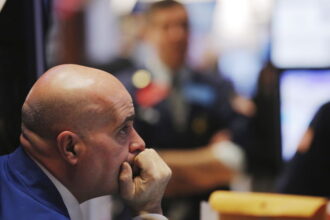TikTok has become one of the world’s most successful businesses in rapid fashion. This year, the short-video social-media service will generate $14.2 billion in revenue, according to eMarketer, up 43% from last year and a tenfold increase since 2020. That implies the company this year will generate more revenue than
Snap,
Pinterest,
and Twitter combined.
Unless it shuts down.
For months now, Congress, the White House, the U.S. military, foreign governments, and a range of other institutions have been warning about the risks posed by TikTok, which surely surprises the many Gen Zers who use the app to watch Scotsmen sing sea shanties or actress Jenna Ortega do the Wednesday dance.
TikTok CEO Shou Zi Chew recently spent five grueling hours testifying before an extremely hostile House Committee on Energy and Commerce. In the opening minutes, Rep. Cathy McMorris Rodgers (R., Wash.) declared TikTok to be “a tool to manipulate America,” asserting it “should be banned.” For TikTok, it was all downhill from there.
Critics like Rodgers think the person with the most power at TikTok is Chinese President Xi Jinping. If you believe TikTok is a tool for China to spy on Americans and distribute propaganda, then details about the ownership and management structure don’t really matter.
But those details are of keen interest to investors—and so is the potential fallout if the app is actually banned.
Illustration by TYCO
TikTok is a unit of ByteDance, a China-based internet conglomerate and the world’s most valuable privately held venture-backed company. Research firm CB Insights counts more than 1,200 unicorns—those private companies worth at least $1 billion—around the world, and ByteDance is first on the list, with an estimated valuation of $225 billion. ByteDance has raised $9.5 billion in venture capital from firms like Sequoia Capital, Coatue, Tiger Global, KKR, SoftBank, and General Atlantic. Barron’s reached out to all of those firms and others invested in ByteDance, and none of them wanted to comment on the debate over TikTok.
Chew testified that 60% of ByteDance—and by extension TikTok—is owned by institutional investors, 20% by employees, and 20% by the company’s founders. “ByteDance is not an agent of China or of any other country,” he said.
But members of Congress don’t believe him. In TikTok, both political parties see the perceived evils of social media and geopolitical risks posed by China rolled into one politicized target. In March, a bipartisan group of senators introduced the Restrict Act, which would set new rules for foreign tech firms and give the commerce secretary authority to ban certain services. While written broadly, the legislation is targeted at TikTok, and it has White House support.
There are three potential paths for TikTok. One is the status quo—but that seems unlikely in the long run, given the vitriol the company faces in Washington. Another possibility is that Congress enacts a ban, President Joe Biden signs it, and the courts uphold a law that would almost certainly be challenged by ByteDance on First Amendment grounds. The third option—both dizzyingly complex and structurally challenging—would be for ByteDance to spin off, sell, or otherwise divest its ownership in TikTok to U.S.-based owners, severing ties to China.
Let’s first consider what would happen if TikTok is banned in the U.S.
TikTok says it has 150 million monthly active U.S. users, about 10% of the global TikTok user base. According to eMarketer, U.S. TikTok ad revenue was $5 billion last year, and should reach $6.8 billion in 2023 and $8.6 billion in 2024. So if there’s a ban, where would the time spent on TikTok—and the associated ad dollars—go?
The consensus on Wall Street is that there would be three winners:
Meta Platforms
(ticker: META), parent of Facebook and Instagram;
Alphabet
(GOOGL), parent of Google’s YouTube; and Snap (SNAP), parent of Snapchat. They each have short-video services of their own: Reels on both Facebook and Instagram, YouTube Shorts, and Snapchat Spotlight. The experience on those apps is almost identical to the one provided by TikTok. (In fact, many clips are cross-posted on all of them.)
In a research note, Morgan Stanley analyst Brian Nowak estimated that 95 million Americans use TikTok daily, for an average 90 minutes a day, “leaving 53 billion hours of digital media consumption time up for grabs.” From a stock perspective, he thinks the biggest winner of a ban would be Meta, with a more muted impact for Alphabet—while he says Snap shares have arguably already priced in some aggressive assumptions about the benefits from a TikTok shutdown.
For Meta, Nowak calculates that every 10% of TikTok time captured would boost profits by about 20 cents a share. If half of TikTok’s time went to Meta, he figures it would boost the company’s estimated 2024 profits by about $1 a share, or roughly 7%. Meta CEO Mark Zuckerberg said on a recent earnings call that the company’s revenue run rate for Reels has topped $3 billion, but that it has yet to break even on the new service.
For Alphabet, the math is less compelling. Nowak writes that a best-case scenario, in which YouTube captured half of TikTok’s U.S. time, would add about $2 billion in revenue and cause him to increase his price target on the stock by about $1, to $135. In the case of Snap, based on the platform’s typical monetization rate, Nowak estimates that every 10% of TikTok time shifted would boost revenue by $440 million, adding about $1.30 to his base-rate stock target of $7, which is well below the stock’s current price just shy of $11. Nowak says the stock price already embeds Snap taking 25% of TikTok time—and he thinks 5% would be more likely.
Evercore ISI analyst Mark Mahaney figures the odds of a ban are still less than 50%, despite the vitriolic tone of the recent hearing. But he notes that a year ago the probability was down in the 5% or 10% range. “The risk has increased materially,” he says. “There’s more consensus on this than in any other political issue out there.”
Mahaney notes that even without a ban, you could begin to see some advertisers—and potentially users—shift to other platforms, given the fierce political firestorm. He thinks YouTube and Instagram would be the most obvious beneficiaries of a ban, although he notes that Snap’s platform benefits from having a demographic user profile that looks the most like TikTok’s.
Piper Sandler analyst Tom Champion sees it slightly differently. His back-of-the-napkin math suggests that, given Meta’s scale, any boost from a TikTok ban would be “incremental,” while “disappearing into the expanse of the Meta properties.” He sees a ban as more of a needle-mover for Snap, both in dollars and time spent, given its smaller size.
Gene Munster, managing partner at Deepwater Asset Management and a former sell-side analyst, thinks banning TikTok would “open a Pandora’s box” that could lead to bans on other Chinese apps—and then retaliation against U.S. technology companies operating in China. He also cautions that Congress sees social-media apps as “increasingly dangerous to the mental health” of youth. He says that Meta and Snap holders should be aware that it is “a function of time before the regulator spotlight turns back to them.”
Meanwhile, Meta’s Zuckerberg hasn’t sounded enthusiastic about a potential ban. BuzzFeed News reported that the CEO told his staff at a company all-hands meeting this past summer that banning TikTok in the U.S. would set “a really bad precedent.”
So, what about a potential sale?
When the Trump administration attempted to force ByteDance to sell TikTok in 2020, two potential bidders emerged:
Oracle
(ORCL), in partnership with
Walmart
(WMT), and
Microsoft
(MSFT). Oracle and Walmart actually reached a deal with the Trump White House in which Oracle would have acquired a 12.5% stake in a new company called TikTok Global, with Walmart taking a 7.5% stake. ByteDance would have retained 80% of TikTok—but with U.S. investors already holding a 40% stake, the thinking was that Americans would then hold a majority stake. The deal fell apart when Biden succeeded Trump. Microsoft’s proposed deal terms were never disclosed.
The Oracle relationship to TikTok evolved into a program called Project Texas, with Oracle providing cloud-computing and other services intended to wall off U.S.-based TikTok operations from the prying eyes of mainland China.
Any new deal for TikTok would be very large, but not impossibly so.
As noted, TikTok had global revenue—not including douyin.com, the Chinese version of TikTok—of just under $10 billion in 2022, according to eMarketer, going to $14 billion in 2023. Meta, Snap, and Alphabet are all trading for about four times 2023 revenue; TikTok is growing faster but faces serious regulatory peril. At a little less than four times 2023 revenue, TikTok would be worth about $50 billion—and that is for all of non-China TikTok, not just the U.S. bit. Let’s assume the institutional holders who own 60% of ByteDance maintain their stakes (although some of them are based in China). If you conclude that the goal is to buy out the 20% owned by founders and some slice of the employee shares owned by Chinese staff, a buyer would need to acquire roughly 30% of the company—or about $15 billion.
Some of the most appealing potential bidders would never get regulatory permission to buy TikTok—including Meta and Alphabet.
Apple
(AAPL) could do it, but it never pursues large deals.
Amazon.com
(AMZN) likely couldn’t win approval from a hostile Federal Trade Commission. Oracle might find it appealing, but following its recent $28 billion acquisition of Cerner, its balance sheet simply wouldn’t support a deal of that size. Microsoft, while embroiled now in a battle with regulators to close its pending acquisition of
Activision Blizzard
(ATVI), could still pull it off—as of the end of December, the company had just shy of $100 billion in cash and marketable securities. A deal that size would likely be too large for private-equity buyers; maybe the company could solve the problem with an IPO.
Both Oracle and Microsoft declined to comment on whether they might want to buy TikTok.
Matt Perault, an analyst at NewStreet Research, wrote in a research note published before the hearing that a forced divestment of TikTok by ByteDance was the most likely scenario—and he says that nothing he heard during the marathon session changed his mind. (Perault is a former director of public policy at Facebook who once testified before Congress on the social network’s competitive position.)
While China’s government has stated its opposition to a forced sale, Perault argues that Beijing won’t be able to stop the Biden administration from issuing a divestment order—and he adds that an outright ban could prove politically unpopular with the nearly half the U.S. population that uses TikTok every month. Sen. Rand Paul (R., Ky.) made that same observation In an op-ed in the Louisville Courier Journal in which he declared his opposition to a ban.
“If you don’t like TikTok or Facebook or YouTube, don’t use them,” Paul wrote. “But don’t think any interpretation of the Constitution gives you the right to ban them….I hope saner minds will reflect on which is more dangerous: videos of teenagers dancing or the precedent of the U.S. government banning speech.”
Commerce Secretary Gina Raimondo recently expressed reservations about a TikTok ban, which is significant given that it’s the Commerce Department that would be tasked with enacting a ban under the Restrict Act.
“While bipartisan support for banning TikTok is growing,” she says, “passing a law to ban a single company is not the way to deal with this issue….The politician in me thinks you’re gonna literally lose every voter under 35, forever. However much I hate TikTok—and I do, because I see the addiction in the bad s— that it serves kids—you know, this is America.”
The TikTok debate is a clash of the titans: China vs. the U.S., Meta and Snap and Google vs. ByteDance, Meta stockholders vs. the large private funds that own most of ByteDance, and 150 million U.S. TikTok users against Congress. Don’t be surprised if the can gets kicked down the road for the next president to worry about, meaning we could be talking about a TikTok ban for the next two years.
Write to Eric J. Savitz at [email protected]
Read the full article here










